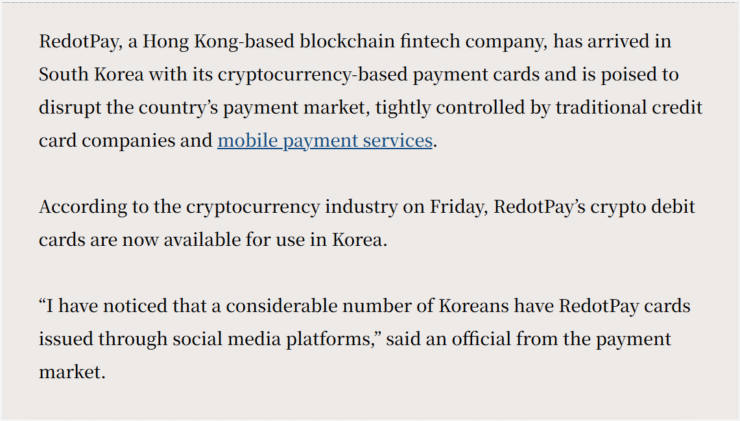Crypto payments are gaining real-world traction in South Korea as RedotPay officially launches its cryptocurrency-enabled debit cards, challenging legacy financial systems with real-time stablecoin transactions. The Hong Kong-based fintech firm is entering one of Asia’s most tech-savvy markets by enabling Korean consumers to spend crypto at any Visa-supported merchant nationwide.
Announced on May 9 via The Korea Economic Daily, RedotPay’s rollout includes both physical and virtual card options. A virtual card costs $10, while the physical version is priced at $100. Setup requires only basic identity verification—name, address, and a valid ID—and some users report instant usability directly from their smartphones upon registration.

This launch follows RedotPay’s February 2025 partnership with Visa and BIN sponsor StraitsX, a strategic alliance aimed at scaling crypto-to-fiat payment solutions across borders. Since its founding in 2023, the company has grown rapidly, now boasting over 4 million users globally.
By bringing its crypto cards to South Korea, RedotPay positions itself to disrupt a payments market historically dominated by major credit card networks and mobile wallet platforms like Samsung Pay. The company’s promise of real-time transactions using stablecoins like USDC and USDT offers a compelling alternative for crypto-savvy consumers.
RedotPay Offers Real-Time Stablecoin Payments and Apple Pay Access
RedotPay’s new crypto cards aren’t just about convenience—they’re engineered for speed, flexibility, and integration with everyday financial tools. The cards support major digital assets including Bitcoin (BTC), Ethereum (ETH), and stablecoins USDC and USDT. Users can fund their cards with assets across multiple chains, including Solana, Polygon, Binance Smart Chain, Tron, and Arbitrum.
What sets RedotPay apart is its real-time transaction engine. Stablecoins are instantly debited from users’ wallets at the point of purchase, and in the case of refunds, USDC or USDT is returned within minutes—eliminating the typical delays associated with crypto settlement.
Adding to its mainstream appeal, RedotPay is fully compatible with Apple Pay in South Korea. This functionality offers a significant advantage in a market where Apple Pay usage is currently restricted to Hyundai Card holders. As RedotPay takes aim at Korea’s entrenched payment systems, this level of accessibility could prove to be a game-changer for crypto adoption at the consumer level.
Crypto Becomes Central Theme in South Korea’s 2025 Election
As digital asset adoption surges in South Korea—with over 16 million citizens reportedly holding crypto—presidential candidates are increasingly turning to blockchain policy as a major campaign issue.
On May 6, Democratic Party leader and presidential hopeful Lee Jae-myung pledged to support the approval of spot crypto exchange-traded funds (ETFs) and introduce broader crypto-friendly reforms if elected. His announcement marks a growing trend of candidates aligning with the country’s digitally engaged electorate.
The ruling People Power Party has also joined the race to win over crypto voters, unveiling its own set of proposals in April. These include legalizing spot crypto ETFs, dismantling the one-exchange-one-bank rule, and building a comprehensive regulatory framework for stablecoins.
As the 2025 presidential race heats up, crypto policy has become a critical battleground—shaping not only the country’s financial future, but also the political momentum behind its tech-forward electorate.
Quick Facts
- RedotPay launched crypto-enabled Visa cards in South Korea on May 9, offering both virtual ($10) and physical ($100) options.
- The cards support BTC, ETH, USDC, and USDT across multiple chains, with real-time stablecoin transactions and refund processing.
- RedotPay cards are compatible with Apple Pay, expanding accessibility in a market currently limited to Hyundai Card users.
- Crypto policy is a major issue in South Korea’s 2025 presidential race, with both major parties pledging ETF legalization and regulatory reform.





